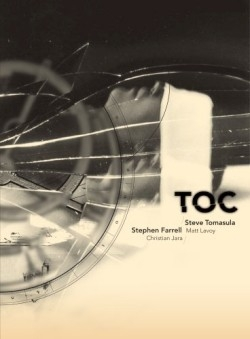TOC
A New Media Novel
“The only subject of fiction is time,” author Stuart Dybek once noted; Steve Tomasula’s latest novel, TOC, a “new-media” novel available only on DVD, takes this idea literally, and presents it in a cutting-edge medium surprisingly easy to navigate, even for the most technologically backwards of readers.
A postmodern mythological epic, TOC was created in collaboration with several artists, and unfolds in stages, set to an eerie musical score with compositions by masters of the avant-garde. The novel turns interactive after the introduction, when the reader is asked to choose a victor in the battle between the characters “Chronos” and “Logos,” twin sons born to the main character Ephemera, and fathered by a time machine.
TOC‘s underlying theme is the hypothetical collapse of time itself; vignettes of the survivors of the “end of time” can be read sequentially or at random. The odyssey of TOC recalls the futuristic novels of Huxley and Orwell (Tomasula’s earlier three novels VAS: An Opera in Flatland, IN & OZ, and The Book of Portraiture also engage with post-apocalyptic themes). The story’s characters belong to one of two distinct tribes, the Tics and the Tocs, who inhabit, respectively, the “West” and “East” zones of the equatorial line established by time’s collapse. Both tribes refer to themselves as “The People” and both believe the “other” is “damned.” TOC‘s subtext is a darkly comedic take on the dangers of religious or political fundamentalisms that discount the “other” as merely nonexistent, or at worst, “evil.” This binary opposition yields one of the novel’s most pro-vocative lines: “If the Not People didn’t exist, they would have to be invented.”
The playtime of TOC varies between one and two hours: a marginal investment for this unique opportunity to explore the newest wave of digital literary media, and to read a hard-hitting (and visually and aurally magnificent) rendition of one of the world’s most ancient moral lessons: the distinctions between right and wrong, fact and fiction, created and imposed by humankind, often toward bloody and ruinous ends. TOC is worth the “read” for all these reasons, especially for those skeptical of the limitations—and curious about the implications for literary fiction—of an interactive “eBook.” TOC is a novel that challenges the authority of the “text” in all contexts.
Disclosure: This article is not an endorsement, but a review. The publisher of this book provided free copies of the book to have their book reviewed by a professional reviewer. No fee was paid by the publisher for this review. Foreword Reviews only recommends books that we love. Foreword Magazine, Inc. is disclosing this in accordance with the Federal Trade Commission’s 16 CFR, Part 255.

